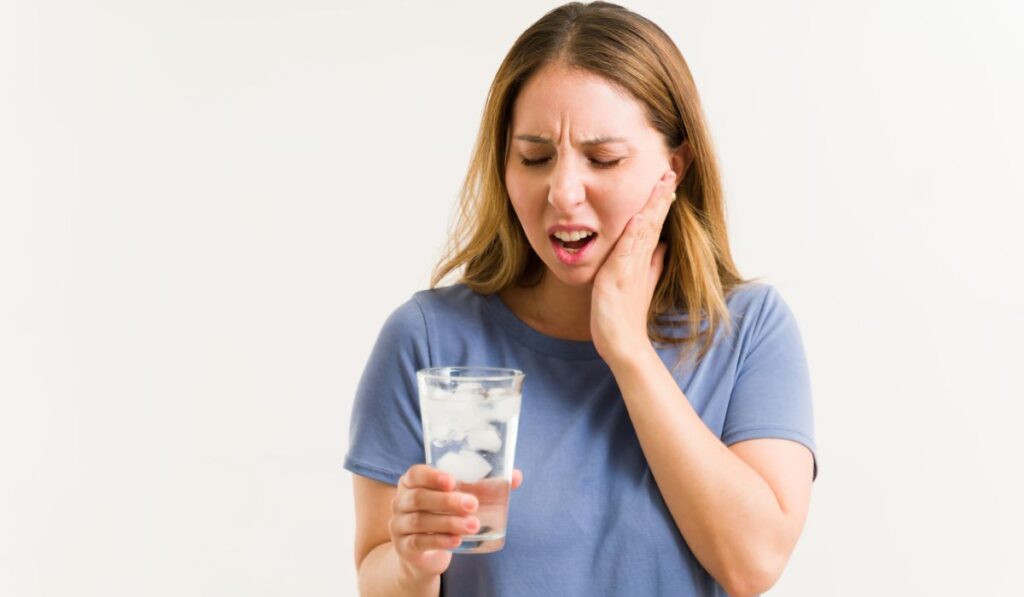Nothing is worse than that searing pain after drinking a cold glass of water. Unfortunately, it’s an occurrence that is quite common but not at all normal. Finding out why your teeth hurt is the first step in solving the problem and living a pain-free life when it comes to your mouth.
Inadequate brushing, Bruxism, disease, and plaque can cause tooth sensitivity. You can solve it by getting a mouthguard, visiting the dentist, or changing your oral hygiene habits. However, you can try mouthwash, salt water, honey, or even green tea for immediate relief.
Tooth sensitivity to cold can come in the form of drinks, food, or even just the air. It strikes painfully and sometimes without any warning. However, there are several reasons your teeth might hurt and even more options to help alleviate it. Tooth pain is not something you have to deal with, despite being a common problem.
What Does it Mean When Your Teeth are Sensitive to Cold Water?

There are many reasons why your teeth could cause you some pain after having a cold drink. Fortunately, many possible causes are easy to recognize, and finding out why your teeth are extra sensitive to cold is the first step in fixing the problem.
Aggressive Brushing
As a child, we are told to brush our teeth really well, but we aren’t taught most of the time that brushing well doesn’t equate to brushing hard. Putting excessive force on your teeth can wear down the protective layers of your teeth and gums, making them sensitive to cold drinks.
Teeth Grinding or Clenching
Grinding or clenching your teeth at night, also known as Bruxism, will slowly erode the enamel of your teeth. This stress can weaken your teeth and expose the nerves or cause sensitivity, making them sensitive to cold drinks and foods until you address the grinding or clenching.
Teeth Whitening Treatments
Whitening treatments, like whitening strips or some kinds of toothpaste, have harsh stain-removing chemicals that can damage the enamel of your teeth. If your teeth are already sensitive, it is best to avoid these treatments and talk to your dentist.
Gum Disease
Receding gums leaves the nerves and porous roots of your teeth exposed, which makes them sensitive to cold drinks. The nerve signals pain when the exposed root is touched by cold temperatures, liquids, or even air. Therefore, your dentist should address gum disease.
Plaque and Tartar Buildup
Plaque builds up when all the food and sugars aren’t being taken off your teeth. This plaque creates bacteria that begin to eat away at your teeth, and over time it can turn into tartar that requires a dentist to remove.
The acid from the bacteria of plaque and tartar will cause your teeth to become extra sensitive since that enamel is being eroded.
Cracked Tooth
When a tooth gets cracked or chipped, it can expose the dentin, which will cause sensitivity to cold drinks. If you notice your tooth is cracked or chipped, the only way to help with the sensitivity, or avoid further issues, is to visit a dentist.
Decay or Leaking Fillings
As time passes and pressure is exuded on your teeth, fillings might leak around the edges. This causes bacteria to collect in the tiny crevices, which makes an acid that will begin to break down the tooth structure.
How Do You Fix Cold-Sensitive Teeth?
Brushing Well
Your teeth only need to be brushed lightly to avoid unnecessary force. You also want to ensure you regularly floss to prevent plaque and tartar buildup.
Getting a Mouthguard
If you suffer from Bruxism, the best course is to visit the dentist and have your mouth fitted with a mouthguard. This will alleviate the pressure from that clenching or grinding and save the enamel of your teeth.
Desensitizing Toothpaste
Toothpaste designed for sensitive teeth can help rebuild that enamel and dull the pain associated with sensitive teeth.
Dentist Visits
You should see the dentist every six months for regular cleaning, but there are also some things a dentist can perform that directly helps with sensitivity.
One of those options is having fluoride treatment. Your dentist can apply fluoride to the sensitive areas of your teeth to help strengthen that tooth enamel and reduce the pain. They can also suggest the use of prescription fluoride at home.
There are also more intense options, such as bonding, gum grafts, and a root canal. Each requires a dentist and is rather invasive, but it can help with your sensitivity issues.
Desensitizing or bonding is when a bonding resin is applied to the exposed root surfaces while a gum graft repairs a small amount of damaged gums.
A root canal is the removal of the injured tooth’s dental pulp and will eliminate any pain felt within that specific tooth.
How Can You Get Immediate Relief from Sensitive Teeth?
Being in pain is never fun, and while you can play the long game and change up your routine to prevent or address sensitive teeth, that doesn’t help you at the moment when your teeth actually hurt.
However, performing a few simple things can help negate some of that pain immediately, although they may not always work.
Hydrogen Peroxide Mouthwash
Since hydrogen peroxide is a mild antiseptic, it can be an effective remedy for sensitive teeth. Rinse your mouth with a hydrogen peroxide solution to help heal the gums and prevent more inflammation.
Green Tea
Green tea contains antioxidants and anti-inflammatory properties, which can help reduce the inflamed area around your teeth and gums. Perform a mouth rinse with unsweetened green tea twice a day.
Honey and Warm Water
Honey is an antibacterial agent that can accelerate oral healing, so rinsing your mouth with a mixture of warm water and honey can immediately reduce pain.
Capsaicin
Capsaicin can be used as a mouthwash or gel to reduce pain since it has analgesic properties.
Turmeric
Turmeric has anti-inflammatory properties, so massaging it into your affected tooth can help reduce some of the pain. Alternatively, you can make a topical paste with turmeric, mustard oil, and salt and apply it to your teeth and gums several times a day.
Saltwater Rinse

Salt is a natural antiseptic that reduces inflammation. To help with sensitive teeth, perform a saltwater mouth rinse for 30 seconds and then spit out the solution.


